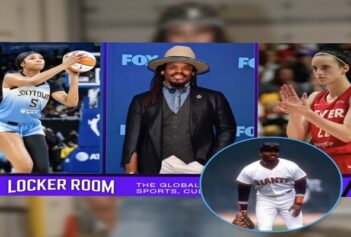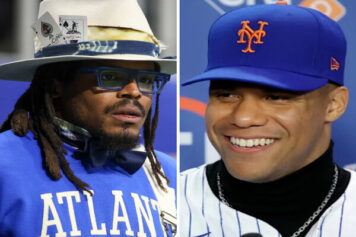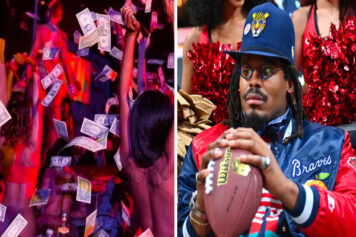When Warren Moon delivered his Hall of Fame induction speech on Aug. 5, 2006, he spoke mostly of his 17 years of playing professionally and the people who influenced his game the most. Towards the end of his speech, though, he addressed what his enshrinement meant for the black quarterback.
A lot has been said about me as being the first African-American quarterback into the Pro Football Hall of Fame, said Moon. It’s a subject that I’m very uncomfortable about sometimes only because I’ve always wanted to be judged as just a quarterback. But because I am the first and because significance does come with that, I accept that. I accept the fact that I am the first.
But I also remember all the guys before me who blazed that trail to give me the inspiration and the motivation to keep going forward, like Willie Thrower, the first black quarterback to play in an NFL game, like Marlin Briscoe, who is here today, the first to start in an NFL game. Like James Harris, who is here today, the first to lead his teams to the playoffs.
Then on into my era with Doug Williams, the first black quarterback to go to the Super Bowl and be most valuable player. Like Randall Cunningham, one of the most exciting players during our era. Like Vince Evans, who played 20-plus years of professional football. All of us did what we had to do to make the game a little bit better for the guys coming after us.
I only played this game not for just myself, not just for my teammates, but I always had that extra burden when I went on that field that I had a responsibility to play the game for my people. That extra burden I probably didn’t need to go out on the field with, because I probably would have been a much better player if I didn’t have that burden. But you know what, I carried that burden proudly.
As I looked at young people all along my route as a professional football player, they always told me, Warren, you got to represent. Warren, you got to represent. Warren, you got to represent.
In 2015, it seems that black quarterbacks are still representing.
Right now, Cam Newton is one of the best quarterbacks in the game, regardless of race. But the cultural significance of what he means to the game has generated as much buzz as his MVP-worthy performance this season. His charm, easy-going spirit, and the Hip Hop flare with which he enjoys the game compelled one Twitter user to describe him as a carefree black boy. When he is not leading the Carolina Panthers on the field, hes on stage with Future. Dabbing.
Future brought Cam Newton on stage at a show last night. There was dabbing. A lot of it: https://t.co/kt3i1kZ0mFpic.twitter.com/nt3WQUgELI
The Source Magazine (@TheSource) November 28, 2015
Tom Brady has an edge over Newton in the MVP race, but, culturally, Newtons ascent represents much more than what we see in his QB rating. Quarterbacks like Brady, Peyton Manning, and Aaron Rogers arent generally expected to represent their people like Moon believed he had to. Its a responsibility black quarterbacks cant avoid, no matter how hard they try.
Before Robert Griffin IIIs career spiraled downwards, in large part because of injuries, he was considered one of the games most promising quarterbacks. Though, perhaps because of his wife being white and his seemingly non-existent public connection to black culture, some black football fans have wondered if he cares enough about whats going in black America.
Russell Wilson, a Super Bowl-winning quarterback, cant escape representing, either. Rumors of his teammates saying he isnt black enough continue to follow him in what is becoming an outstanding career.
And we all remember when the late Philadelphia NAACP chapter president J. Whyatt Mondesire wrote a misbegotten column criticizing Donovan McNabb for focusing on his passing over his running game and, thus, according to him, abandoning the essence of what makes a great black QB.
Fair or unfair, these critiques reveal how much they are expected to be de facto ambassadors for the black community. Indeed, the quarterback position is an ambassadorial post, one that was largely reserved for white men.
Every player in the game earned the right to wear the shield, but only a select few were tapped by the league to represent it to the world. Usually, it is a quarterback. A white one.
Not even Moon was branded as a leading face of the league, despite his outstanding passing career. Newton, however, may be different.
Because of his spectacular play, magnetic charm, good looks and corporate-ready branding power, Newton is being debated as the next face of the league and for good reason. In addition to leading the only undefeated team in football, he has the potential to a draw younger, blacker pop culture fan base.
To be sure, the young quarterback is not an activist who is outspoken about police brutality or the most pressing issues that impact black Americans. But he doesnt need to be. His unforgivable resolve to be himself, regardless of who likes it or not, is the epitome of black defiance.
By default, Newton is challenging the conservative system that is the NFL.
That is more than enough to earn adoration of black people who care as much about him as they do about the game of football. As the face of the league, Newton would not integrate into the NFL culture; he would infiltrate and change it.
By doing so, he would bring much of black America with him. That may not have been the kind of representation Moon was referring to in his induction speech in Canton, Ohio.
Perhaps, though, it could be what Newton has in mind as he ascends to NFL superstardom.




